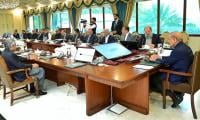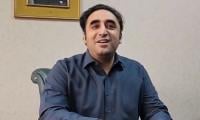Nawaz Sharif please pay attention
Press media regulator receives annual funds from Rs20m to Rs40m only; salaries of staff are delayed; has no proper office space
ISLAMABAD: As the world celebrated Press Freedom Day on Monday, there lies an office on the third floor of a commercial plaza in the busy Melody Market of Islamabad which is supposed to protect the rights of journalists and address the complaints against newspapers and journalists in Pakistan.
The newly shifted office of Press Council of Pakistan (PCP) gives a 1970s-look of an abandoned floor, however, when one reaches the office, some rooms could be found where a staff of 27 works to regulate the print media industry of the entire country.
The PCP has recently shifted to Melody Market because the previous building in which it had rented some rooms near Zero Point Islamabad was declared unsafe by the government after the October 26, 2015 earthquake.
“We could have continued in that old building but one day one of our female registrars gotentrapped in the lift and the lift broke down and banged on the ground, injuring the lady. Thus we decided to shift from there”, said one of the officials of the Print Media Regulator of the country.
Unlike the Pakistan Electronic Media Regulatory Authority (Pemra), which has its own building and besides government budget has other means of earning as well, the Press Council of Pakistan keeps on begging from the Finance Division the entire year to release funds necessary to run the day to day affairs of the council including salaries of the staff.
The government’s step-motherly attitude towards the Print Media Regulator raises many questions because it is the government which has so many problems with the newspapers yet it has never considered it appropriate to make Press Council of Pakistan a forum which can address the issues arising out of objectionable media coverage. The opposition parties also have similar issues with the newspapers but no one has ever raised the issue of the deliberately-made dormant Press Council. The common people have problems with the journalists and the journalists themselves face plenty of issues but no one has ever tried to make an institution out of Press council of Pakistan. The PCP has remained unheard of media, being the regulator itself, while the electronic media regulator is not only functioning as an independent regulator but has proved itself a real regulator.
Interestingly both the regulators -- Pemra and PCP -- were established in 2002 but due to continuous ignoring of PCP, it remained restricted to a subordinate and subservient department of the Information Ministry. The funds released by the Finance Division to the PCP are mere peanuts as these vary between Rs20 million to Rs40 million per year depending upon the mood of the Finance Ministry. The PCP pays Rs394000/month as rent of its new office whereas the total amount sanctioned for it is Rs 29 million for the years 2015-16. The Council will have to adjust the salaries of the staff from the sanctioned money. Officials at PCP tell that their salaries get delayed by many months because of non-availability of funds. The Information Ministry, of late, has written to the Finance Ministry to provide ample funds to the council so that it can perform its duties.
Press Council of Pakistan was established through Ordinance No. XCVII of 2002, to hear complaints/cases/appeals for and against the print media and other authorities. It consists of eighteen members and a Chairman. The eighteen members include two MNAs, one nominated by Leader of the House and the other by Leader of the Opposition in the National Assembly, Vice Chairman of the Pakistan Bar Council, four nominees each by All Pakistan News Papers Society (APNS), Council of Pakistan Newspapers Editors (CPNE), and Professional Bodies of Journalists (PFUJ), nominees of Higher Education Commission (HEC), nominee of National Commission on Status of Women in Pakistan and a mass media educationist.
Although the Ordinance was issued in 2002 but the PCP remained a dormant body and the Council could not be constituted till October 2011. It was notified for the first time on 17 October 2011 but PCP Rules and Regulations could not be notified till December 2014. Ex-Chairman Dr Rana M Shamim, took up the matter and succeeded in removing most of the bottle necks i.e. framing of PCP Rules 2015, PCP Regulations 2015 and constitution of Inquiry Commissions for the Headquarters and Provincial Capitals, which task remained unaccomplished for the last 14 years.
“Establishment of Sub-Offices of the Council in each provincial capital is legal obligation under section 3(3) of the Ordinance for which the Federal Government has to arrange buildings and other facilities. The PCP in its very first meeting held on 01-11-2011 decided to open sub-offices in the provincial capitals. Consequently, a sub-office was opened in Aiwan-e-Iqbal, Lahore where several meetings/functions were organized by the PCP. In its meeting held on 25-03-2015, the Council unanimously decided that general meetings will be held in each province by rotation and to hold next meeting in Karachi. Holding of meetings and carrying out other activities in the provinces is not possible without opening offices in the provincial capitals. Similarly, constitution of Inquiry Commissions each headed by a retired High Court judge or person qualify to be a judge of High Court and two members in the Federal capital, in each provincial capital and also in different regions is legal obligation of the Council. The establishment of PCP Sub-Offices and Inquiry Commissions in provincial capitals was wisely incorporated in the Ordinance to avoid inconvenience to the people of remote areas especially of Baluchistan, KPK, Sindh and also of Punjab”, says a government document sent to the Finance Ministry.
The basic function of the Press Council of Pakistan, according to section 3 of the Ordinance, is to implement the Ethical Code of Practice as set out in the Schedule to the Ordinance. Complaints against violation of Ethical Code of Practice are to be heard by the Inquiry Commissions according to section 10 of the Ordinance. The Council, in its general meeting held on 25-03-2015, has constituted five Inquiry Commissions (for the Headquarters and the four provincial capitals). The complaints relating to different provinces have already been entrusted to the respective Inquiry Commissions.
It may be pointed out here that the Inquiry Commissions were constituted for the first time on 25-03-2015 as requisite nominations were not provided by the CPNE despite reminders. The flow of complaints from all regions will increase tremendously after establishment of the Inquiry Commissions in Sub-Offices.
“Funds amounting to Rs29.000 million have been proposed to be allocated to the Press Council of Pakistan for the Financial Year 2015-16, which are not sufficient even to meet operating expenses of the Headquarters. Through the PCP Rules notified by the federal government on 02-03-2015, the diet money @ Rs10,000 per day is to be paid to each member of the Council and each member of the Inquiry Commission attending the meeting. The Inquiry Commissions have to dispose of the complaints within 30 days which is possible only through day to day hearing. One hearing of the five Inquiry Commissions involves payment of Rs150,000 per day as diet money (apart from other operating expenses). This expenditure was not kept in view while preparing the budget 2015-16. Overall additional funds amounting to Rs67.000 million are required for strengthening of Headquarters and establishment of Sub-Offices of Press Council of Pakistan in all the Provincial Capitals of the Country. Section 4 of the Press Council of Pakistan Ordinance 2002 provides "the Federal Government shall provide grant-in-aid for meeting the establishment, administrative and operating expenses of the Council", the Information Ministry letter sent to Finance Division reads.
Saad was of the view that the battle of politics should be fought solely through political means
KP govt decided to develop gemstone business as a formal export sector and cluster at the Namak Mandi would be...
Khyber Pakhtunkhwa Minister for Higher Education, Archives, and Libraries, Meena Khan Afridi. — APP FilePESHAWAR:...
Vehicles and horse carts passing through flood water at Bara Bazar area on Khuwani bridge after heavy rain in Peshawar...
Amid the failure to revive the cash-bleeding PIA, government is left with no other option but to sell it to any...
Picture showing the Silver Jubilee Gate of the University of Karachi. — APP File KARACHI: The University of Karachi...







